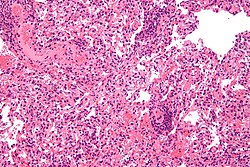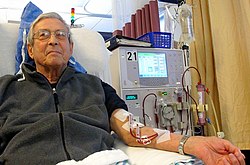Organ donation
Organ donation means that an organ is transferred from the body of one person to that of another person. This is done by a type of surgery called an organ transplant. The donor, the person whose organ is used, may be alive or recently dead. The person receiving the organ is called the recipient.
Organs that can be transplanted are the heart, kidney, liver, lung, pancreas, intestine, skin, and thymus. Tissues that can be transplanted include bone, muscle, tendon, cornea, heart, and veins.
The most commonly transplanted organs worldwide is the kidney, followed closely by the liver, the heart. The most commonly transplanted tissues are the cornea, bones, and muscle.
There is a great demand for organs and tissues. Donors must give permission. Iran is the only country regulating donors selling one of their kidneys for payment, and there is no waiting list. There is a field of medicine called "regenerative medicine" that has made scientific advances to grow or create organs or tissues from stem cells.
Organ Donation Media
The National Donor Monument, Naarden, the Netherlands
Map showing the coverage of three international European organ donation associations:* Balttransplant Eurotransplant Scandiatransplant
Vaughan Gething, Welsh Government Health Minister, addresses the Kidney Research UK Annual Fellows Day; 2017







